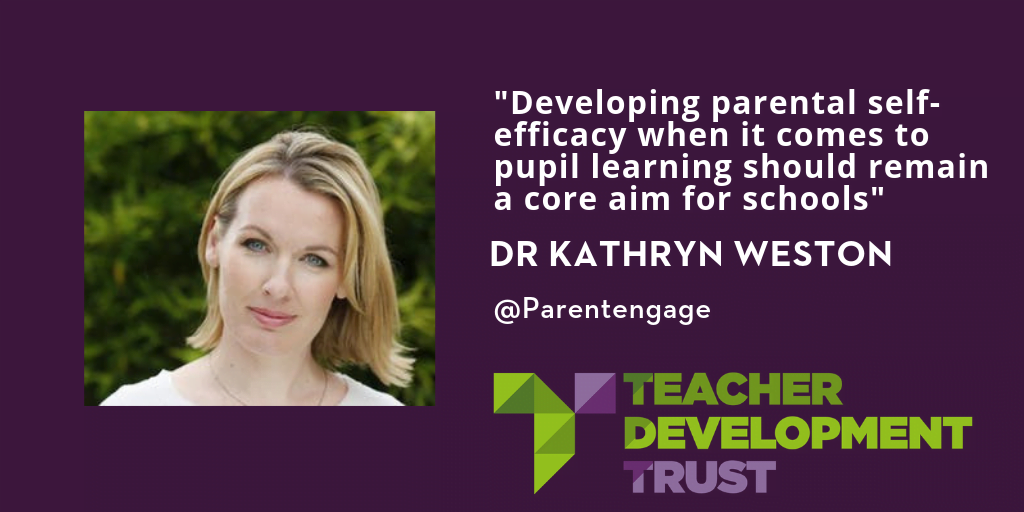How can schools build a powerful relationship with parents using strategic thinking about CPD? Parent-school engagement expert, Dr. Kathryn Weston, lays out some evidence-based ideas.
Parents remain teachers’ most powerful allies when it comes to ensuring children are reaching their potential, yet schools are sometimes resistant to involving, consulting and working with them. There are understandable reasons for this; staff may not feel particularly confident about talking to parents, insist that it is not part of their professional remit and may be simply too busy to do so. We know that schools are under unprecedented financial strain at present, teachers expected to shoulder the burden of improving academic outcomes for pupils, as well as spot and respond to early signs of pupils’ mental distress.
What’s not to like?
We know that parents can play a fundamental role in boosting children’s ability to thrive, based on:
- the aspirations that parents hold for their children,
- the extent to which they care, and
- their ability to support their child with their learning.
If parents feel confident in their ability to help their child, and are able to act on that, chances are you will see results in the classroom. Developing parental self-efficacy when it comes to pupil learning should remain a core aim for schools. Parental involvement at the school cake sale, whilst nice, won’t drive outcomes. Parents actively engaging with their children’s learning, and working in effective partnership with the school, will.

What you need to strive for
Strive for alignment between parent and teacher, families and schools; in terms of your values, vision and in practical terms. Think of the image of a baton being passed between two teammates, both working in partnership with a greater goal in mind: helping children flourish. Any great partnership requires rapport and trust between you. One way of creating trust to consult with parents and families re: their feelings, aspirations and dreams for their children. Through asking and acknowledging parental views, feelings and even worries, parents feel valued. Asking also implicitly recognises their role as “expert” in terms of that particular child.
Here are 10 principles to consider when thinking about engaging parents:
- Often parents simply want to be heard. They want to know that you care about their opinion, are interested in their views and have taken them onboard. For example, for parents of SEN children, it can be disheartening not to be consulted about optimal ways for supporting their child, when they possess such in-depth knowledge and expertise. You could ask parents if they can suggest any useful areas of training for staff in order to help their children.
- Concentrate on the low-hanging fruit first. Who are the parents who actually want to engage in ways that would be useful to the school? Schools are very good at identifying and talking about “hard to reach parents” rather than actually working with those are ready and amenable to a partnership approach.
- Rapport is everything and early investment in the home-school relationship is a clever investment. Transition provides an optimal time to set the tone as families are more receptive to engaging with the school at this point.
- Ensure staff are aware of the importance of the powerful role that parents play in shaping children and young people’s outcomes. Consider including work on transition and home-school relationships in your induction and ongoing CPD programmes.
- Ensure that staff feel confident about working with your parents. Help them identify pivotal points where the relationship may come under stress and strain. Share good practice within the school and find regular time for teachers and TAs to discuss parental engagement and communication.
- Articulate a vision of working with families that has developed through inclusion of parental voices. Ensure that school values around home-school partnerships are embedded within school action plans.
- Encourage subject, pastoral and other middle leaders keep abreast of the latest research re: “what’s working” in the area of parenting engagement. The Education Endowment Foundation and the Institute for Effective Education provide regular updates and blogs that staff can subscribe to.
- Sustaining positive relationships with parents can be done through low cost strategies such as: positive phone calls home, letters to parents acknowledging that their support is making a difference and letting parents know how you have taken some of their suggestions onboard.
- Don’t be afraid to ask parents for help. Within your school community, you will have parents working across a range of professions, possessing a wide range of skills and diverse cultural perspectives. Dip into this resource pool when needs be.
- Watch your language. School reporting season and parents’ evenings are pivotal points in the relationship between parent and teacher. Never give parents information about their child without explaining what steps they can take to help. Don’t use “edu-babble”; talk in plain terms that all parents can grasp. If you feel that particular pupils are thriving and there is no need for a long chat, why invite busy parents in? Perhaps a phone call will suffice. Be open to doing things differently.
Dr Kathryn Weston is a parenting expert, motivational speaker and co-author of “100 Ideas for Primary Teachers: Engaging Parents”. Find out more about her tools and school support at www.drkathyweston.com
Further reading:
Goodall, J. and Weston, K (2018) 100 Ideas for Primary Teachers: Engaging Parents. Bloomsbury.
Goodall, J. and Weston, K (2020) 100 Ideas for Secondary Teachers: Engaging Parents. Bloomsbury.
EEF (2019) Working with Parents to Support Children’s Learning: Guidance report. Education Endowment Foundation.
